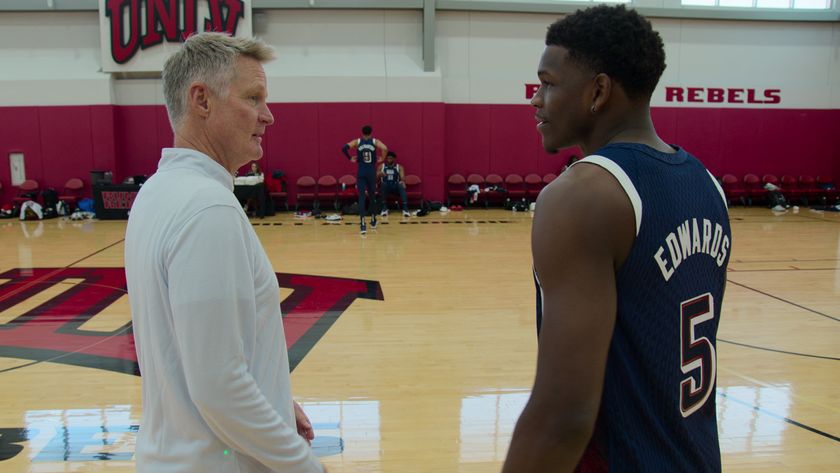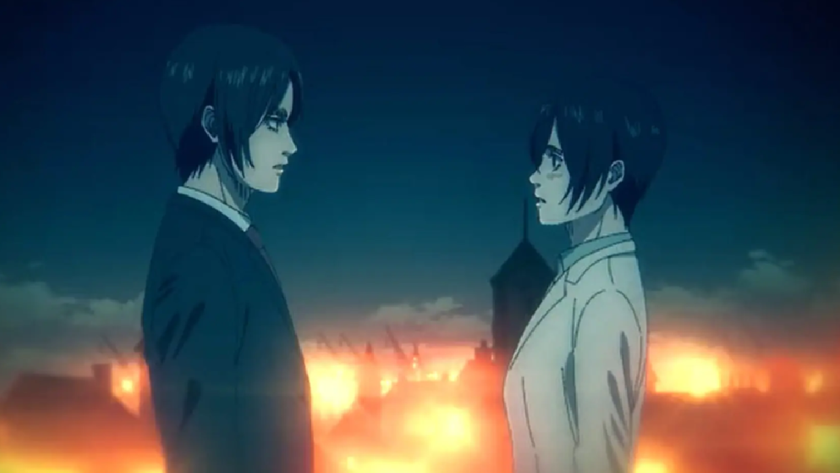The Watch Director Akiva Schaffer Talks Aliens, Improv, And More
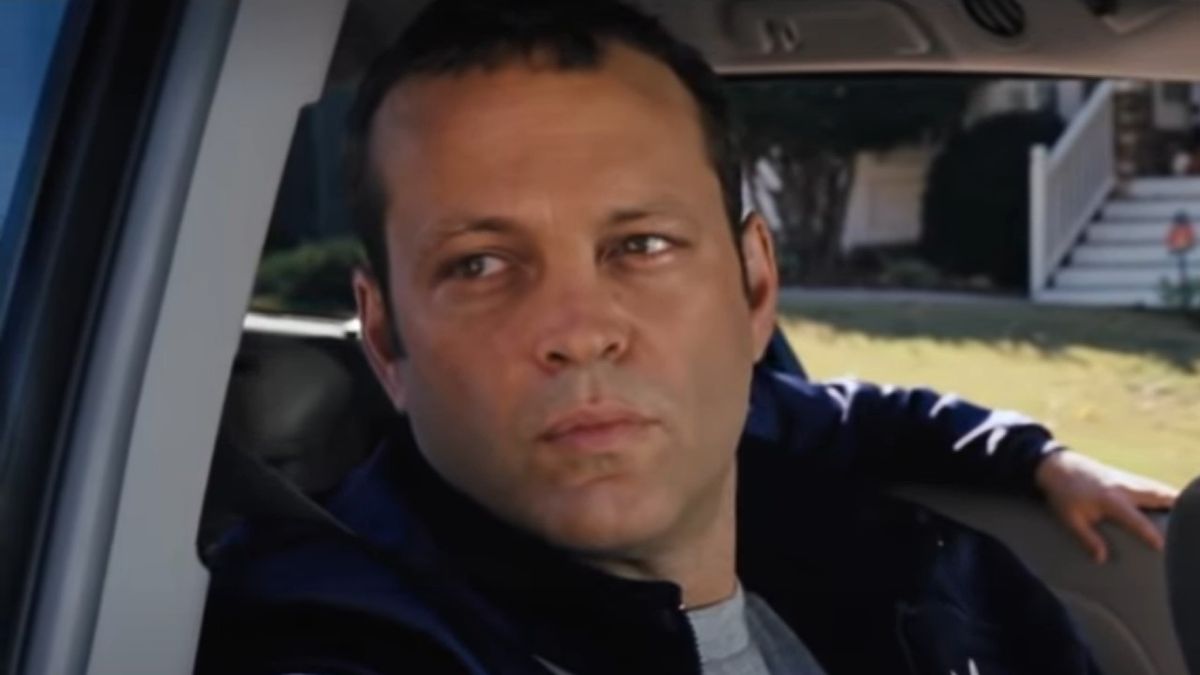
When you have a cast that includes the likes of Ben Stiller, Vince Vaughn, Jonah Hill and Richard Ayoade, there is a particular level of pressure involved. Because you want to create a balanced ensemble, there is one side that says each actor should have equal time on screen, while the other says to just let the camera follow the funny. And it was certainly something that director Akiva Schaffer had to deal with while making The Watch.
With the new science-fiction comedy in theaters this weekend, I recently had the chance to speak with the filmmaker on the phone about his time making the movie. Check out our conversation below in which he talks about the evolution of the script, the amount of improvisation that was done on set, and what it was like working with expert creature actor Doug Jones.
I know that this project was actually in development for a while, but how much did the script change from when you first signed on to what we see in the final cut?
Well, I came on in May of last year after the Seth [Rogen] and Evan [Goldberg] script had been written. That was the first draft I ever read, was already Seth and Evan’s – pretty much what we shot draft. And you’re asking what change between what I read in May and now?
Yeah.
A bunch of stuff. Seth and Evan were still on as writers working with us so it wasn’t like they turned in the draft and we were like, “That’s the end of that!” They were around. It’s just a bunch of examples between then and now. I don’t know how boring this answer is about to get to be [laughs]. We added the skateboarding kid, the thing with him was new – we just thought that there needed to be some sort of escalation in the danger. We added the whole egging thing, the whole interrogation thing, the whole kid-getting-killed thing. The whole third act, I would say, got kind of switched around. Just the sort of normal, development-y stuff you do when you’re kind of honing everything.
Were those changes during pre-production and development or were you also still coming up with stuff while you were shooting?
CINEMABLEND NEWSLETTER
Your Daily Blend of Entertainment News
Mostly pre-production. Because I came on in May but we didn’t shoot until October, so we had like five months. Also, just tweaks for the actors as we started casting, getting Vince [Vaughn] and Ben [Stiller] had signed on just before me and they all had the thing about like, “Oh, I feel like my character, if he was more like this… I would not have him say this kind of thing…” So everybody starts weighing in so that everyone is comfortable with the material and everyone feels like they can deliver on the roles. So it wasn’t just me, it was everyone kind of weighing in so I could make it something I would be comfortable shooting and make it and they could make it better for acting and et cetera, et cetera.
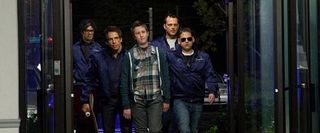
On that note, this movie had a great ensemble; really four of the funniest actors working today. When you’re shooting though, are you actively trying to spread around the laughs or does your camera just follow the funny?
It’s a blend of both. I don’t think we were consciously thinking like, “Oh, I haven’t heard from that character in a while, I need to give him more lines so everybody has more lines.” I don’t think it was ever about that. We just made sure that everybody had their little story, whatever it is, and then just tracking it through. It’s kind of all the same thing. You’re trying to make it as funny as it can be, but you have these four guys so you’re like, “What would this character say in this circumstance? And then, “What would this guy be saying?” You start to think of a joke for each one of them.
Did you allow for a lot of improvisation on set?
I mean, our working mode was basically was just do two to five takes on average to get the “as written” done, and then as soon as that was done we would sort of turn over to what we called “free ones.” I think that’s a Vince term. He would be like, “Free one? Can we get a free one?” So it would basically be I would be watching the monitors and at the point where I knew I had the scene and I was going to be fine in editing then I would yell, “Alright, free one!” And then those guys are just so good. I’m sure every time they’re doing it as-written they’re thinking of the other things that they could be saying. So by the time that I said “Free one” they had what sounded to me like a stockpile of different stuff to try. And then also through all the different revisions of the script I had this system. I had this assistant named Ethan whose whole job was to compile all the old drafts and right before we would shoot a scene he would hand me the scripts, like every version of the scene, so I could mine it for lost looks that had been written along the way, or just cool lines that I was like, “Oh, you know what? That line is kind of worth it!” And so I would just quickly leak in a little dialogue of my own things that I could just shout out. “Remember this one, guys? Try that!” Just so that we would have as much stuff as possible. Those guys would just bring great, surprising jokes when you let them go. Most scenes that ended up in editing were I would use a lot of the written and then I would use bits and pieces from the improvised and it would move and everything. Some things, though, after they started improvising just evolved so much that we ended up using most of the made-up stuff that they made up.
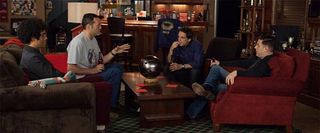
This is your second feature after Hot Rod, and I know you also directed a lot of the Lonely Island digital shorts for SNL, so I’m curious what you took away from those experiences that you applied to working on this movie.
I don’t have a pat answer for that one [laughs]. I was just 26 and we had had just gotten done with our first season of real TV and then we jumped right into a real movie, so it was all really exciting. But everything was kind of a learning process. Everything was new, from working with a crew to shooting on film, every part of it. So I kind of learned all the basics there. And then over the last six years of shorts I learned to work with bigger crews, because we did some pretty big music videos that would rival a movie crew for the day, and I got to do all the different genres and play with black-and-white and do slo-mo and use a crane and do a cool tracking shot, steady-cam, and just playing with all of the tools you use in a movie. So by the time I got to this movie I was much better equipped overall for every aspect of the filmmaking. And then new challenge of this was managing an ensemble of a bunch of big actors at once rather than one host who you could just kind of revolve around. Those were things I never did before.
You also have the CG and the alien side to this story, and I wanted to ask about the experience working with Doug Jones. The stuff we’ve seen him do with Guillermo del Toro in the Hellboy movies and Pan’s Labyrinth are just amazing and I was hoping you could talk a bit about working with him on this movie.
He’s awesome. Have you interviewed him before?
I never have, actually.
We’ll, you’ll enjoy it [laughs]. He’s one of the nicest, sweetest guys – not being Hollywood to say it – he’s just such a nice guy. We were just lucky to get him because we were like, “We need one of those guys who is really good at doing that kind of creature acting.” And then they were like, “We have this guy,” and we were like, “Holy shit! Alright!” So it was awesome. He gets in this crazy suit that in between takes they have to unzip and put stands on him because it would just get hot as well. We were shooting the scene where Evan and Jamarcus find the alien for the first time in the backyard. It was maybe 12 degrees out that night, it was freezing, and everybody was freezing, and Doug was just cooling out, just fine [laughs]. And then we had the big mask and the animatronics, so there were three guys off to the side with radio controls, like they have with radio-controlled cars, just controlling the face and then Doug would just do these little weird twitches and cool walks and things that would just give it personality that makes you feel like it had thought, which was just awesome. And then on certain shots we would use CG to enhance things, like make him look deadlier, or replace an arm, or dilate the pupils in his eyes or something. Just little things to make it feel more alive.
I also wanted to take the chance to ask about The Adventurer’s Handbook, as obviously you worked with Jonah Hill on this movie as well. Is that project still happening?
There is no exact plan on it, but I did just talk to Max Winkler, who is one of the writers on it, like maybe three weeks ago about it. Just figuring it out and Jonah…everybody is willing to bring it back to life. We don’t know if it would be the same cast or different people now or if Jonah would even be in it or if he would just be a writer/producer on it. But we’re all still excited to give it a go, so it’s definitely not dead, but there is no concrete plan.

Eric Eisenberg is the Assistant Managing Editor at CinemaBlend. After graduating Boston University and earning a bachelor’s degree in journalism, he took a part-time job as a staff writer for CinemaBlend, and after six months was offered the opportunity to move to Los Angeles and take on a newly created West Coast Editor position. Over a decade later, he's continuing to advance his interests and expertise. In addition to conducting filmmaker interviews and contributing to the news and feature content of the site, Eric also oversees the Movie Reviews section, writes the the weekend box office report (published Sundays), and is the site's resident Stephen King expert. He has two King-related columns.
Most Popular








